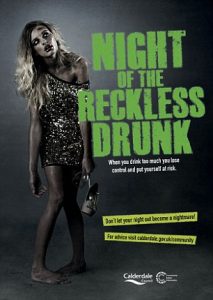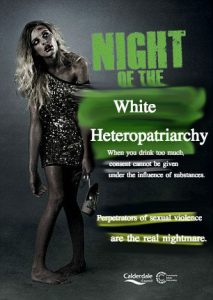Original Advertisement:

Original Advertisement Analysis:
The Calderdale council in the United Kingdom issued an advert entitled, “Night of the Reckless Drunk” as part of a campaign in 2013 to discourage residents from binge drinking. The advertisement features a white woman with zombie-like features who is covered in dirt, supposedly participating in a night of drinking. This advert is a clear illustration of the slut-shaming and victim-blaming surrounding sexualized violence, which can be demonstrated by each of the slogans on the advertisement that implies the survivor is to blame for sexual assault. The text underneath the header reads, “When you drink too much, you lose control and put yourself at risk”, which is a statement that insinuates that if the woman in the ad was intoxicated while she was assaulted, it would be her fault because she lost control and put herself in that situation. Furthermore, the phrase, “Don’t let your night become a nightmare” furthers the victim-blaming discourse by asserting that it is an individual’s responsibility to not be assaulted. Several of the male equivalents of this advertisement (linked in Daily Mail article in references) do not include any mention or implication of sexual violence in relation to binge drinking. These discrepancies depict a dangerous and systemic reality where survivors are immediately discredited if they have consumed substances. It suggests that the woman in this ad made a choice as to whether or not she would be assaulted, and men inherently cannot control themselves because they perpetually desire sexual contact and are thereby excused. The discourse is also especially harmful to male survivors of assault.
Jammed Advertisement:

Jamming Philosophy:
In the jammed version of this ad, I re-named the advert “Night of the White Heteropatriarchy.” I did this in order to highlight the whiteness of this ad, as well as the heteropatriarchy where heterosexual male dominance is the true zombie-like nightmare to be feared in our society. Furthermore, I chose to focus on whiteness because many mainstream advertisements or campaigns that attempt to address sexual violence don’t acknowledge that sexualized violence affects racialized communities at disproportionately higher rates (Sokoloff, 2005, p. 39) as well as LGBTQ+ communities (Rothman, 2011, p. 57) Additionally, considering that this is an advertisement that was produced by people living in the heart of the British Empire, there cannot be a discussion about sexual violence that takes place on unceded territories without also acknowledging the ongoing process and impacts of colonialism, and how sexual violence affects Indigenous communities at higher rates as a result of colonization (Keel, 2004, p. 1). These interlocking systems of oppression ultimately shape how survivors of sexual violence are perceived and believed in Western society.
To further jam the advertisement, I replaced the phrase, “When you drink too much, you lose control and put yourself at risk” with, “When you drink too much, consent cannot be given under the influence of substances”. This is to be clear that an individual cannot consent to sexual activity under the influence of any substance, even if they are only a little drunk.
Lastly, the final tagline of “Don’t let your night out become a nightmare” has been changed to, “Perpetrators of sexual violence are the real nightmare,” in order to subvert the original message of the advert that the survivor is to blame for violence. This phrase puts the blame on the perpetrator, where it belongs.
References:
Harding, E. (2013). “Fury over rape poster that portrays victims as ‘reckless drunks’ who ‘put themselves at risk’”. The Daily Mail. Accessed June 28, 2018. Retrieved from: http://www.dailymail.co.uk/news/article-2531273/Fury-rape-poster-portrays-victims-reckless-drunks-risk.html
Keel, M. (2004). “Family violence and sexual assault in Indigenous communities.” Walking the Talk: Australian Institute of Family Studies. No. 4: 1-31.
Rothman et al. (2011). “The prevalence of sexual assault against people who identify as Gay, Lesbian or Bisexual in the United States.” Trauma, Violence and Abuse, 12(2): 56-63.
Sokoloff et al. (2005). “Domestic violence at the intersections of class, race and gender.” Violence Against Women, 11(1): 38-64.